
Transcript of Fresh Dialogues with Charlie Rose
by Alison van Diggelen, host of Fresh Dialogues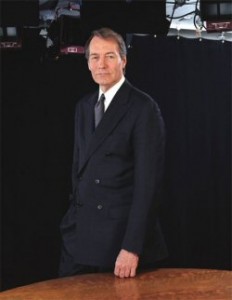
Today on Fresh Dialogues we talk to Charlie Rose, the acclaimed host of the Charlie Rose Show on PBS. His show has been described as the last refuge of intelligent conversation on television. I interviewed him after his Celebrity Forum lecture at the Flint Center in Silicon Valley on February 26, 2009. We talk about ENERGY POLICY, HIS INSATIABLE CURIOSITY AND WHY HE HAS A “GREAT AND GLORIOUS LIFE.”
Alison: Charlie, thank you for joining me today on Fresh Dialogues. You spoke highly last night about Silicon Valley and you’ve interviewed a lot of Silicon Valley luminaries. Can you talk about what – in your opinion – makes Silicon Valley so special and what these luminaries – like Sergey Brin and Larry Page – have in common?
CR: Certainly they have in common curiosity. Certainly those two have in common great intelligence. And they all have in common – I think – a sense of wanting to explore the unknown. The economy today is a place of uncharted waters, but also the world they live in. I interviewed today the President of Stanford University, John Hennessy, the cofounder of Twitter, Evan Williams; Reid Hoffman from LinkedIn and a friend of mine who is an entrepreneur from Los Angeles. There is a passion about the future and they bring to a consideration of the future enormous tools which they have learned, which include the computer and other things.
Alison: And does it give you optimism, being in Silicon Valley, that we have a future, that we’re going to come out of this (recession)?
CR: Yes it does. I think technology is part of the solution and so does Barack Obama – by the way. Not because he told me that, but because you read what he said. He said it in a speech to Congress, he said it on Inaugural Day and I suspect he believes it and will continue to say it: science and technology are part of the key to unlocking the future.
Alison: You’ve interviewed Nobel laureates, business leaders, world leaders…have you ever been tempted to influence government policy, business strategy or even enter the venture capital world, like Al Gore has done, because you must have so much wisdom in so many areas?
CR: I’ll take your question only to the last point about so much wisdom in so many areas. I have never been…I invest my own money in a whole range of different kinds of things, and when I say that I don’t want it to sound large, because it’s not. My role is as a journalist. I’m not in the role of being an advocate for anything. My goal is to provide the kind of analysis that helps people make a decision to approach an issue. If I can do that, then I’m in good shape.
Alison: But you’ve never been tempted to voice an opinion? If Tom Friedman or Obama were to say…
CR: Tom Friedman is very different. Tom Friedman writes a column…
Alison: Sure
CR: He’s not a reporter for the New York Times, although he may report within his column. But he writes Tom Friedman’s opinion…
Alison: But what do you say when Tom asks for your opinion… even if it’s off camera?
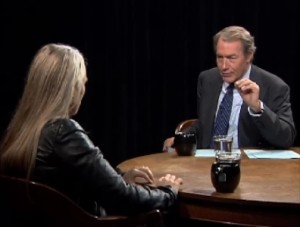 CR: Oh, it is always off camera. Tom and I have conversations about how we see the world and we share that idea. My interest in that conversation is because I’m a man of questions and curiosity and what I’m always doing is testing how I see the world against new ideas, new people, in the interest of somehow coming to…greater understanding. Tom Friedman has been on our program more than anyone else. His range is extraordinary, certainly from the Middle East to foreign policy in general and then technology and the whole question of alternative energy sources, our dependence on fossil fuel, and his new book, Hot, Flat and Crowded is in a sense I think, a call for a new energy policy. I mean the country – and this is not just the previous administration, it may go back for several administrations – has not had a serious energy policy.
CR: Oh, it is always off camera. Tom and I have conversations about how we see the world and we share that idea. My interest in that conversation is because I’m a man of questions and curiosity and what I’m always doing is testing how I see the world against new ideas, new people, in the interest of somehow coming to…greater understanding. Tom Friedman has been on our program more than anyone else. His range is extraordinary, certainly from the Middle East to foreign policy in general and then technology and the whole question of alternative energy sources, our dependence on fossil fuel, and his new book, Hot, Flat and Crowded is in a sense I think, a call for a new energy policy. I mean the country – and this is not just the previous administration, it may go back for several administrations – has not had a serious energy policy.
Alison: And what do you think of Tom’s premise that America has lost its groove and will get its groove back by embracing the energy technology sector and green tech?
CR: He believes, what Tom believes is that… “A” I essentially agree with his instinct and analysis about America having lost its groove, on the other hand, I think it can do it in many ways, of which taking the leadership in terms of alternative energy sources is only one way. But there is an argument to be made that the United States in a sense can reassert its leadership in the world by engaging the energy question.
Alison: You’ve said that the public has not persuaded the government that we’re prepared to make sacrifices in order to be green. What sacrifices do you think Americans need to make?
CR: No. I don’t think…it’s not the question of whether the public has not. The government has not persuaded the public that this is in the essential and long term interest of the United States.
Alison: Do you think Obama can do that?
CR: I think he has the core skills to do it. I think it takes a focus and I think it takes a passion and he clearly has signalled. You know, as we speak, it’s day 36 of the Obama administration and he’s clearly signalled that three things are at the forefront of his domestic concern: energy, health care and education. So it’s on his agenda. Therefore, can he take that kind of priority and move it into policy and achievement is a question that only time will tell.
Alison: Talking about curiosity, you’re known for your insatiable curiosity. Did that curiosity – going back to the early days: Charles Peete Rose Jr, as a young boy…did that curiosity ever get you in trouble as a child?
CR: Constantly
Alison: Can you tell us about that?
CR: No…oh God no. I constantly wanted to know and experience …everything. I was never intrigued by drugs. I always liked alcohol for example, but I was never intrigued by drugs and so I never had cocaine in my life, or a whole range of…none of the heroin. Never had it. It wasn’t because I deserve any medal for that…I don’t – I was never tempted to do it. I asked Sean Penn once why he never did drugs and he said because I liked alcohol. I mean, I never did drugs either and was never tempted to do it, and perhaps the reason was not so much I loved alcohol but because I was simply in love with the idea of doing, experiencing, feeling, traveling and I always found out that the experience itself – of doing those things – was enough for me.
Alison: And where did that curiosity come from Charlie?
CR: It’s two things. It may be a bit genetic but I don’t understand that because my parents had no relationship to what I do. It may have come from the roles that I played. Malcolm Gladwell has a new book called Outliers
Alison: Yes
CR: Which is a whole notion that you’re influence by the circumstances that put you in a certain place. My circumstances put me in a country store which my father owned but my mother ran and so therefore my role was to be able to engage people. Curiosity was a great tool to engage.
Alison: So you actually served in the store?
CR: Serve would not be the word we would use. Work would be a better word.
Alison: OK
CR: It wasn’t service. I mean I didn’t volunteer. My father said this is what you’re going to do. I was an only child, so there was no escape.
Alison: Tell me, you also said you’re curious about what makes people tick, what they dream about. Mr. Rose – what is your dream?
CR: My dream most of all is to engage life and to have the experience of discovery. I think you do that better with a woman in your life and I don’t have that at this time. But I also want to create, in a very specific way, a true global conversation.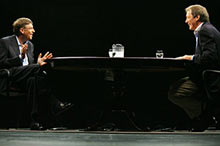
Alison: And how do you intend to do that? Or are you doing that already?
CR: I am doing that already, but I can do that in a much more, sort of, ordered way.
Alison: Are you planning to use the web?
CR: I am using the web – that’s a given right now.
Alison: But…further, into China etc.?
CR: Sure sure. Not only that, but over the air and on cable broadcast. It is my curiosity about those things that drives me forward. I mean, this has been a great day – I learned more about Twitter today because I had the CEO of Twitter on the show today; I learned more about LinkedIn because I had the CEO and cofounder of LinkedIn on. I have a greater sense of where Stanford stands today because of my experience with John Hennessy, the President of Stanford. I mean, all of that feeds my curiosity and it takes me to another place.
Alison: There are only so many hours in the day. How do you prepare for a day like today? You have to be the expert…in Twitter, the expert in…
CR: No, no, it’s not that. I don’t have to be the expert. That, you have to understand, is not what I have to be. I will never hold myself out to be the expert. My role is to be, in a sense, both ignite, inspire and create a platform for engagement by experts, it’s not to be an expert.
Alison: But you have to know enough about the subject to ask the right questions?
CR: Knowing enough and being an expert is a very different thing, you know, and it would be foolhardy to think that because I can read over the next 24 hours some…I’m doing one of the key executives for Google (Marissa Mayer)…you know it’s silly for me to think in the next 24 hours, and here we are at 10.30pm, and I’m going to leave my hotel at 10 (am), that I’m going to be able to be some expert in anything. I bring to the table already a broad familiarity with Google, and I bring to the table, because of conversations in the last week with Marc Andreesson, Jeff Bezos, I’m grounded in where technology is and what they’re doing and all of that will go with me to the Google campus, but I have no illusions about the fact that I’m supposed to be an expert.
Alison: And how will you prepare? Walk us through how you will prepare for tomorrow…
CR: Just read and read and read and read. And talk. Get on the phone with somebody and say: tell me, what is it you think I should know? And then they may tell you seven things you know, and they may say something you hadn’t thought about.
Alison: And where do you get your information? I know you said last night you read all the newspapers, but do you go online and Google the person?
CR: Oh sure. I will Google the person if I’m going to a dinner party tonight and they’re going to be there.
Alison: And what about Twitter? Are you on Twitter yet?
CR: As of tomorrow
Alison: Great
CR: I’m very excited about it. You know I have a nightly television program which…all these technologies are my friend…
Alison: Yes
CR: Because what my interest in… is to distribute what I do. I’m fortunate in that I have a reputation…must use that awful word, a brand name, because I’m not so much a product. But I have all those things, so therefore my interest in maximizing distribution is made for the technology community.
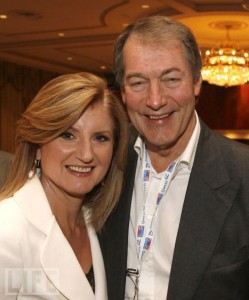 Alison: And do you see yourself doing this until …your last day on earth?
Alison: And do you see yourself doing this until …your last day on earth?
CR: It’s not an idea that I find abhorrent.
Alison: Do you see yourself ever retiring?
CR: No I don’t. I mean, I have a great and glorious life.
Alison: And what makes it great and glorious, Charlie? What is it that feeds you?
CR: (pause) What makes it great and glorious is the fact that I get up every morning with a new adventure.
Alison: Yes…
CR: The adventure is fueled by interesting people. I get a chance to control my own destiny. I do something that is immediately either appreciated or not. I get feedback. And then I meet people like you. Different people, of different skills who you’d never necessarily know or understood that would come on your scope.
Alison: And you enjoy that stimulation?
CR: Yes
Alison: Great. Well, Charlie Rose, I really appreciate your taking the time for Fresh Dialogues. It’s been a pleasure.
CR: Thank you
To listen to the Fresh Dialogues interview with Charlie Rose, click here
For another interview where Charlie Rose provides the answers, not the questions, check out Gillian Tett’s Lunch with Charlie Rose.
For more Fresh Dialogues interviews click here
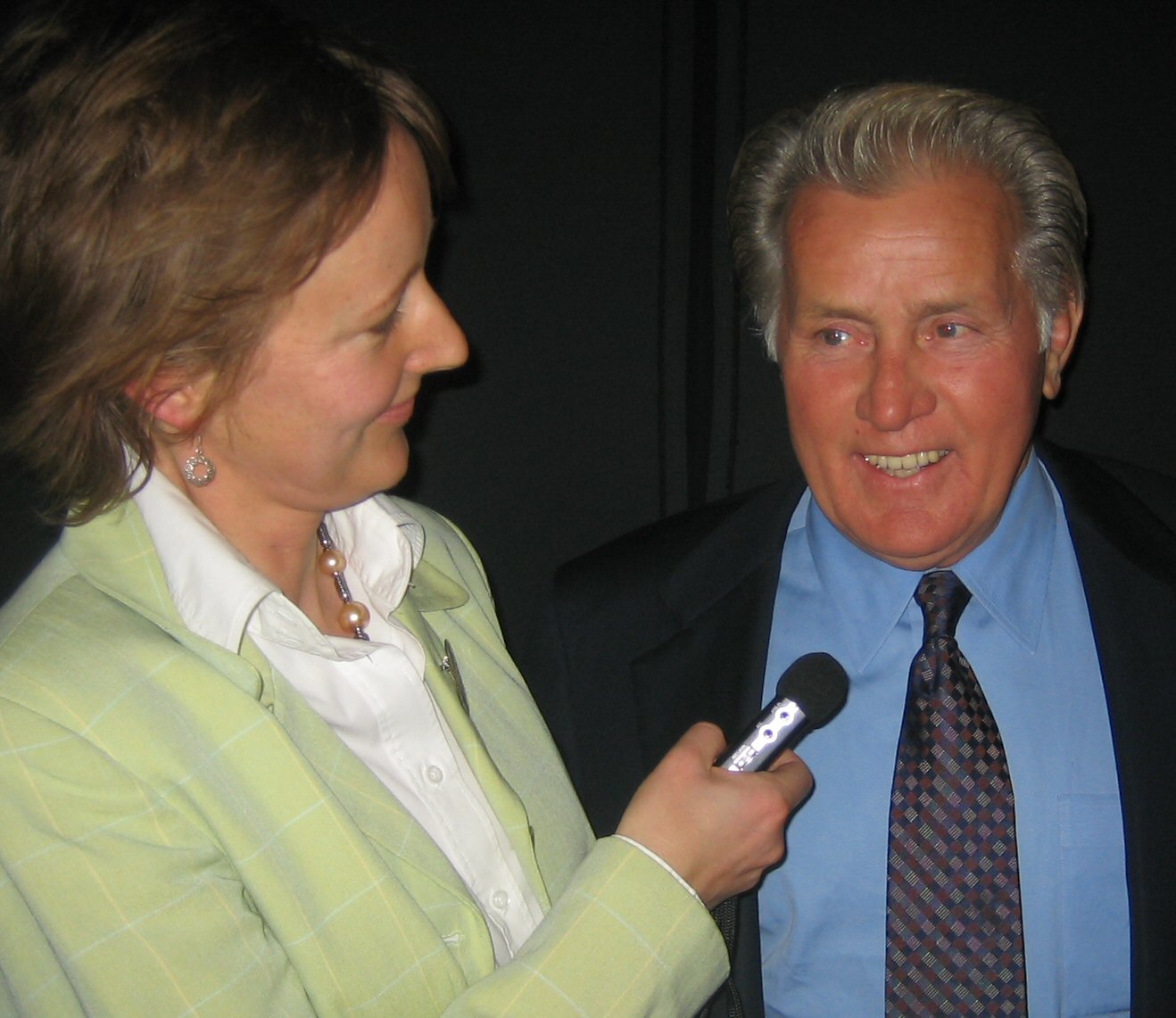
Martin Sheen, the activist and actor
By Alison van Diggelen, host of Fresh Dialogues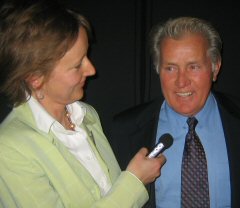
Download or listen to this lively Fresh Dialogues interview
We welcome feedback at FreshDialogues.com, click on the Contact Tab | Open Player in New Window
Check out the new Fresh Dialogues YouTube Channel for more exclusive interviews, including Elon Musk, Harry Hamlin and Jessica Jackley.
I had the pleasure of interviewing Martin Sheen who was visiting Silicon Valley as a guest of Dick Henning’s Foothill College Celebrity Forum Series. In this first part of our Fresh Dialogues interview, Martin talks about the roots of his social activism, his faith, his marriage and his movies.
We also explore:
* Money and happiness
* Silicon Valley millionaires
* Social conscience
* What is God?
* His college fantasy
* His heart attack during the filming of Apocalypse Now
To read selected quotes from the interview click here
Here is Part Two of Fresh Dialogues with Martin Sheen when we explore his environmental activism, his “West Wing” perspective on President Barack Obama and what two exciting movie projects Martin will be working on through 2009.
Note: Martin donated all proceeds from his Celebrity Forum appearance to the Berkeley based nonprofit, The San Carlos Foundation What a guy!
Check out the Fresh Dialogues YouTube Channel more exclusive interviews.

Martin Sheen’s Fresh Dialogues Quotes
By Alison van Diggelen, host of Fresh Dialogues
On happiness and money
“I disagree with the philosophy that you can’t buy happiness. I know a lot of wealthy people who are happy as Larry…what you can’t buy is joy. Joy is very very costly.”
On what brings him joy
“The realization of my flawed humanity…that the great mystery of the universe includes me personally… I feel to the core of my being that I am loved, and if I can be loved anyone on earth is capable of feeling they can be loved.”
On what God is
“I don’t know what God is, but I have a profound, fundamental belief that God is in fact love. That there is a reality there and I am personally loved. I know it’s true for everyone if it’s true for me, but I can’t explain it and I can’t make anyone aware of it.”
On how he developed his social activist ideals as a golf caddie
“Around the age of 14, I became aware of the injustices associated with the work. We were non-entities to them…and they often used obscene language in front of us….we were little boys and they were abusive… anti-Semitic … racist. And they, for the most part, were upstanding members of the community, businessmen, lawyers, doctors. As the result of being a servant at so young an age, I learned how NOT to treat servants whether they’re waiters of bus-boys or cabdrivers. …and I organized a strike.”
On his green motivations and action
“There’s a Hebrew adage that says, ‘he who hath offspring giveth hostages to the future.‘Well I’ve given children and grandchildren, so they own that future. We have to be aware of our responsibility to future generations.”
On his heart attack while filming Apocalypse Now
“I got ill in the Philippines and I damn near died. They got me to a hospital and it was like in the movies. I was on a gurney being rolled through the corridors, lights were flashing and faces were coming and going, and this little face came alongside of me and I realized it was my wife Janet. She leaned down and whispered in my ear, ‘It’s only a movie babe.’ And I started to get well at that moment.”
Silicon Valley’s Visionaries – Oscar party for techies
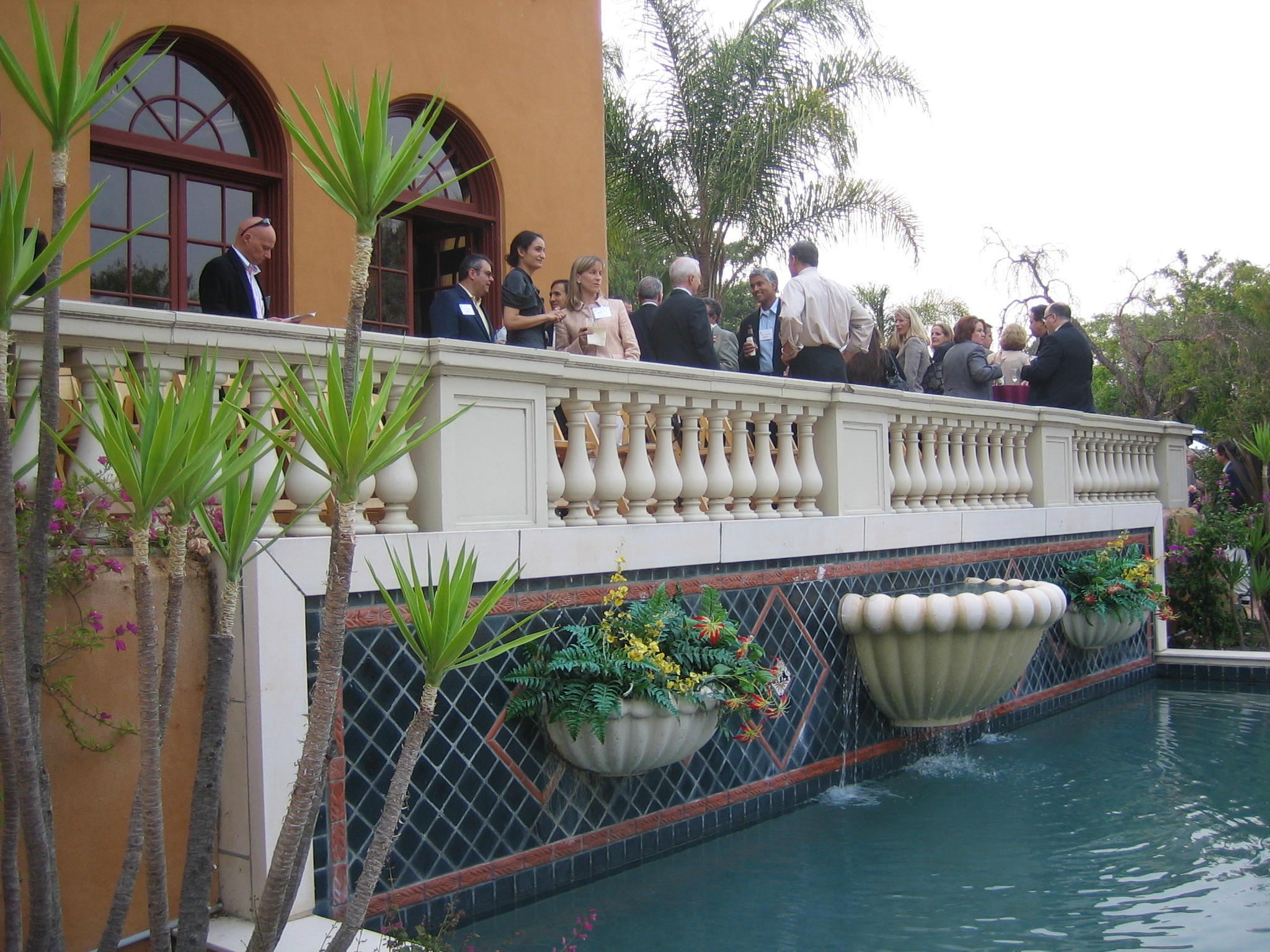
The only things missing were the red carpet and the paparazzi at last Wednesday’s SDForum’s Visionary Awards ceremony. It had all the trappings of the Oscars: glitz and glamor, champagne and cocktail dresses. OK, there were more business suits than bustierres, I admit. But I think the brain power at this Silicon Valley event was probably ten to the Nth power of its LA counterpart. I kept expecting an announcer to say: “Reed Hastings is appearing with fabulous thoughts today, combining high IQ with the always elegant ideas for movie delivery.”
Held at the private home of Heidi Roizen and David Mohler in Atherton, the party kicked off with a VIP only event inside the Italian villa. Backed by a suit of armor, and looked upon by a giant Bison head and stag’s head, SDForum’s CEO Susan Lucas-Conwell (sporting one of her signature French silk scarves) made the introductions, as everyone crowded into the wood beamed hall. Susan teased the crowd about revealing how the five visionaries are actually chosen, but the selection process remains a well guarded secret. Ann Winblad is giving nothing away.
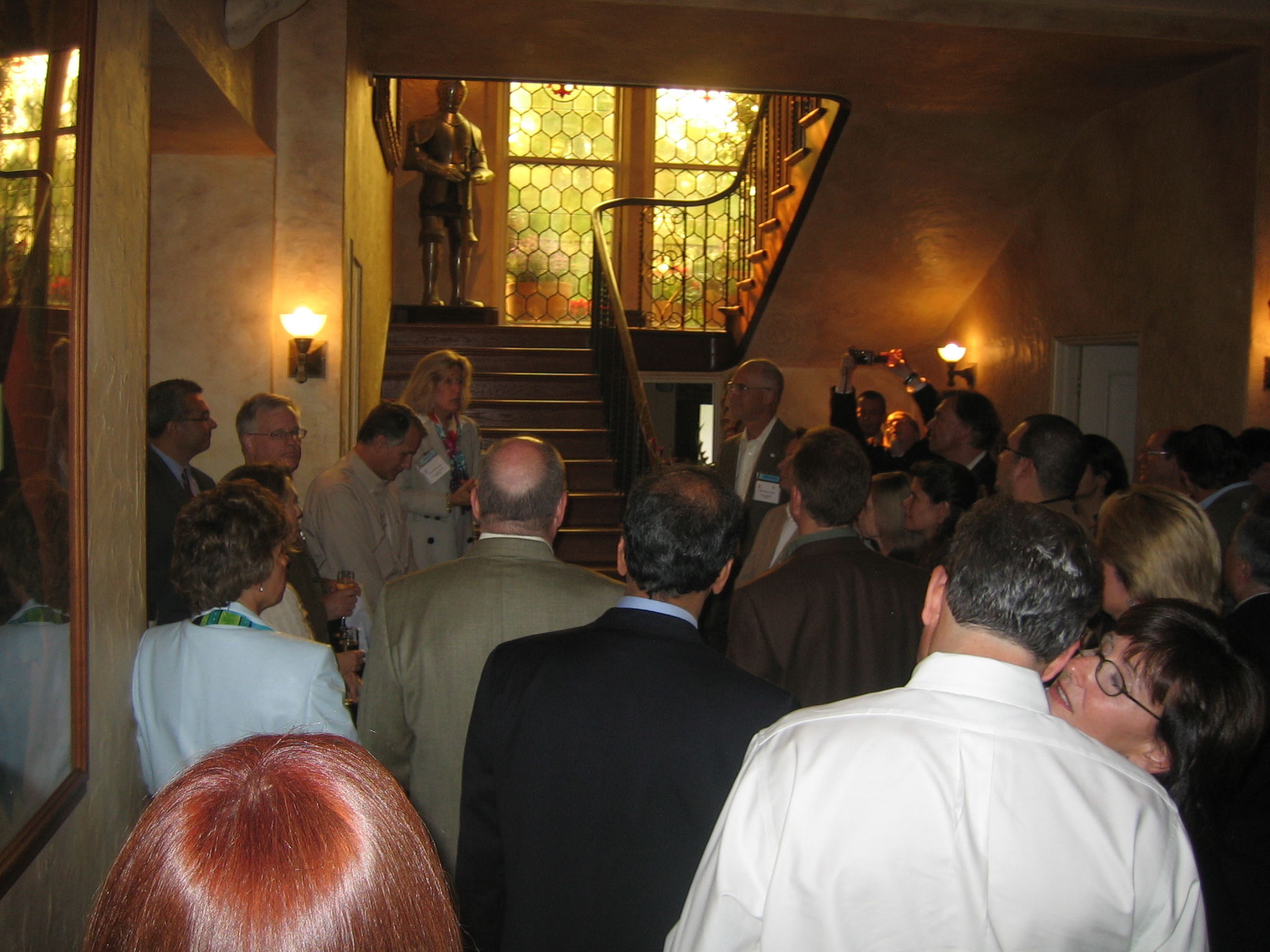
I chatted to Cromwell Schubarth, editor of the Silicon Valley Business Journal who reports that contrary to the fate of many newspapers, like the Merc, his paper is thriving. Exploiting a niche and doing it well is key, he tells me. Next up: The Green Mayor: Chuck Reed, who was unususally enthusiastic. “The best days are ahead of us!” he exclaimed. Perhaps the optimism of all those successful techies and entrepreneurs rubbed off on him. Or maybe it was his delight in driving his wonderful Prius to the event. He told me he gets a cool green 44 MPG. That would make anyone a wee bit jovial, the way gas prices are surging!
Talking joviality, the exuberant Heidi Roizen gave me some of the skinny on her startup: SkinnySongs (an interview for Women’s Radio seems inevitable). She was determined to get the visionaries to sign her “virtual” bookshelves, a masterful tromp l’oie in her living room, already adorned with Sergey Brin, author of “Googled” among other big techy names. A smart move by Heidi: no doubt adding many $’s to the value of her home, even in this down market.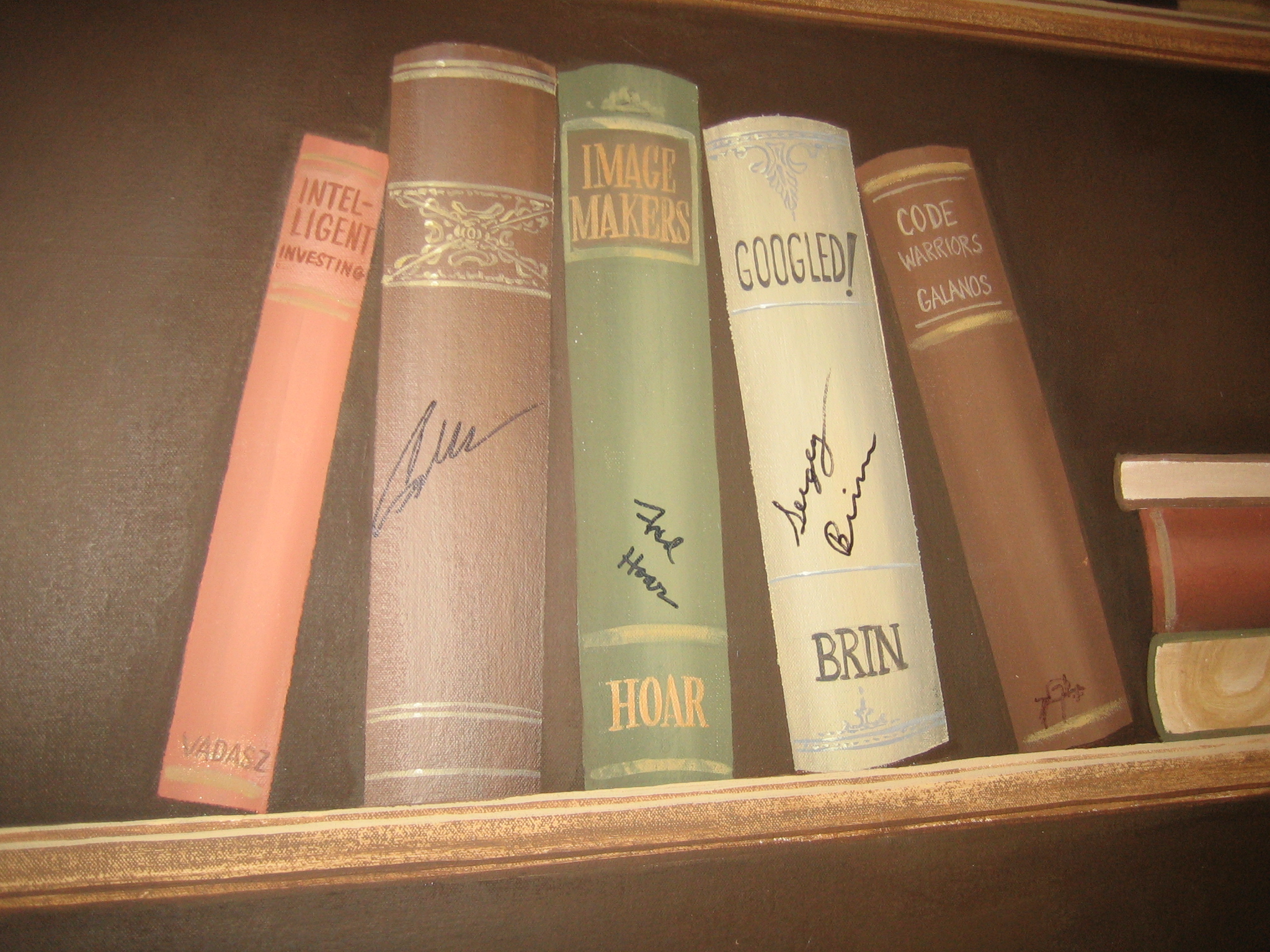
I was cheered to hear a visionary like Forest Baskett (former CTO of Silicon Graphics and Partner at VPs NEA) pushing the case for wind power and electric cas. Moving from 20c a mile (gas) to 2c a mile (electric) sounds pretty compelling to me.
Diane Greene, pioneer of mainstream virtualization and CEO & co-founder of VMWare was the most modest of the bunch. She simply credits her ‘visionary powers’ to being an optimist. According to her intro, she established a company culture that is employee-focused and about being “nice people”. Mendel Rosenblum summed it up by saying “she showed you can build a multi-billion dollar software company and not be a jerk.” Amen to that.
I look forward to exploring both her company culture and her great passion for sailing (she tells me she sails a trimoran) when I interview her for Women’s Radio later this summer.
Founder of Netflix, Reed Hastings had some interesting wisdom to share about growing a startup: success is all about e
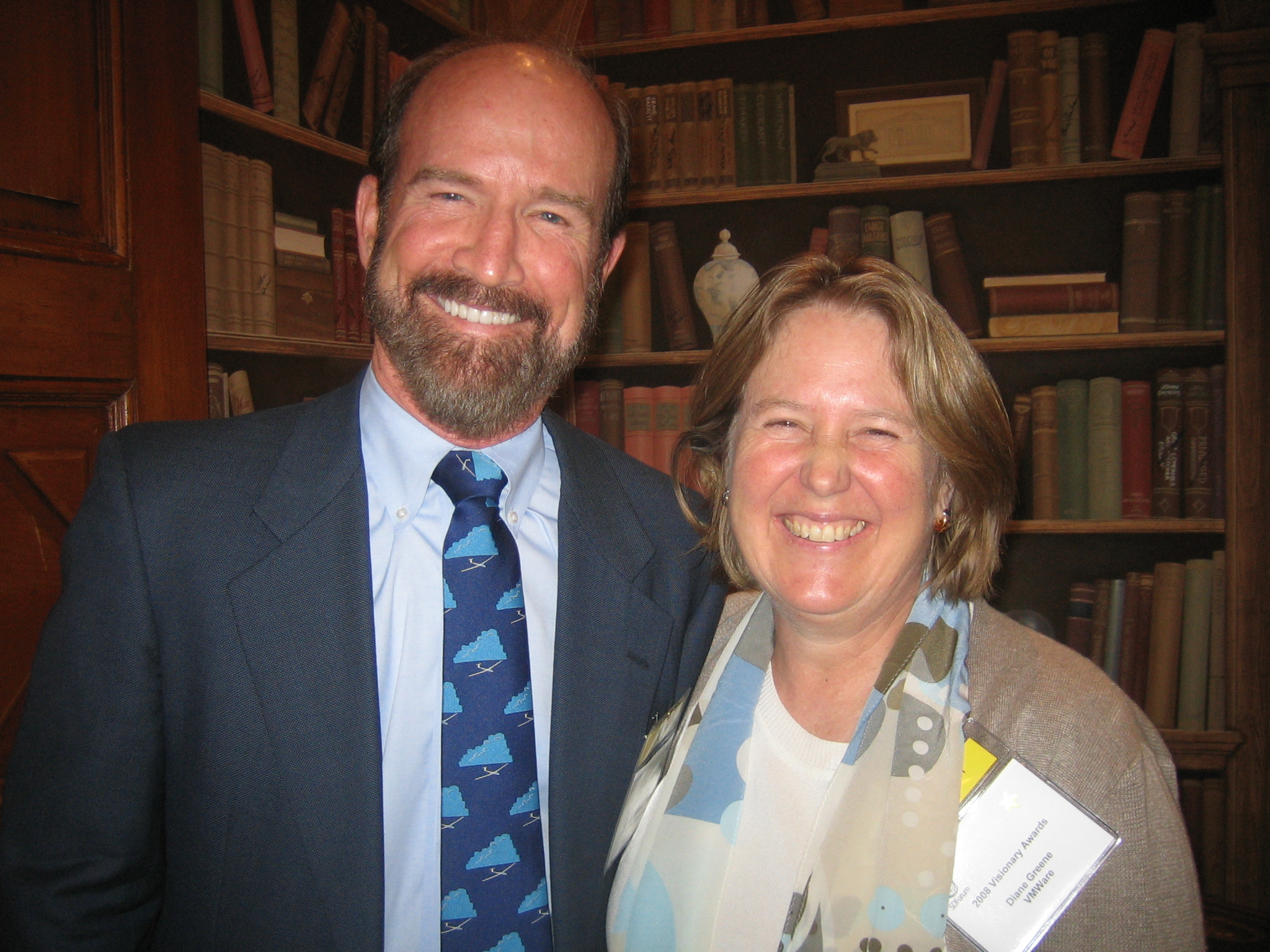
mployee freedom he says: encourage creativity, take risk, do things different…
And finally: Steven Levy, senior writer for Wired Magazine and author of “Hackers” was entertaining: he described all the poses Bill Gates goes through in the space of a two hour interview – from rocking madly, almost horizontal, to fetal position. Steven is proud of the fact he antagonized the richest man in the world so much that he threw a pencil at him! Only a geek would boast that claim to fame.
Heidi warned me the party goes on till the wee hours…sadly I couldn’t stay around to see if techies really can party like the Oscar party crowd. But with Heidi at the helm, I don’t doubt they’d give it a good try.



